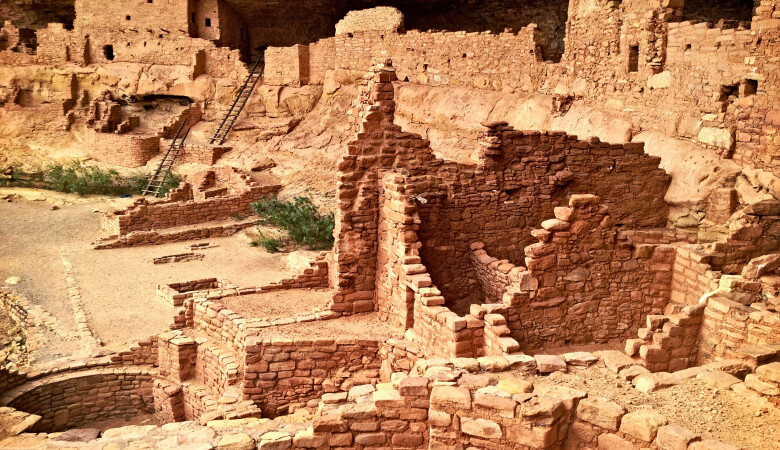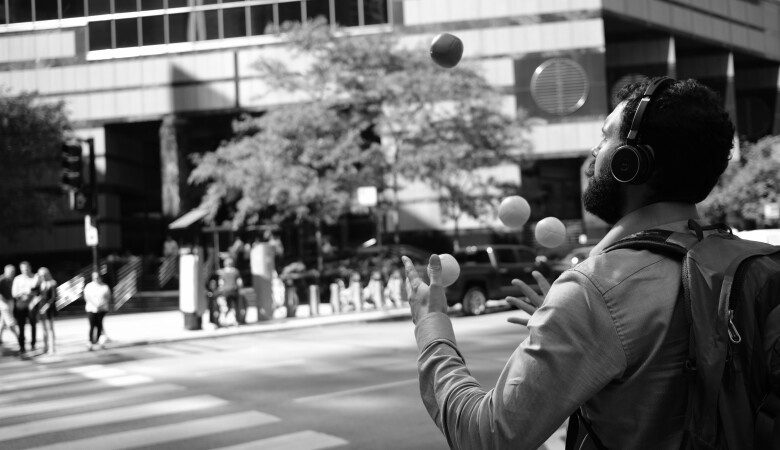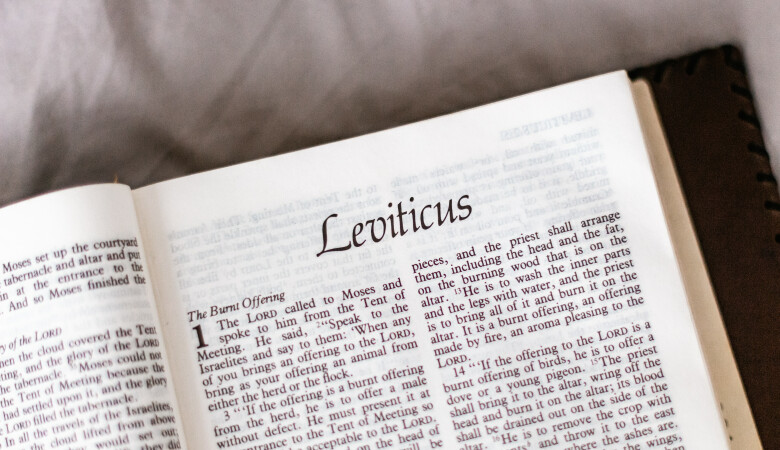The Priesthood Changed... and With It, the Law (Hebrews Sermon 27 of 74)
May 01, 2011 | Andy Davis
Hebrews 7:11-17
The Law of God, Exaltation of Christ, Animal Sacrificial System
The Difficulty of Change
The older I get, the truer this statement is, I think, that change is very, very difficult to accept. It's hard to see life change isn't it. It's hard to have transformational change around us all the time. And I think, categorically, the hardest change of all, is religious change. Change in the area of traditions. I'm told by those who have been in the church far longer than I, that one of the big changes that happened in this room happened in the early '70s. I don't know if you know this, but the balconies used to extend left and right all the way to the wall. And they went out right to there and there and in some way, they blocked some of the light that could stream in the sanctuary and members of the congregation felt it would be wise to do a major renovation and remove them.
Well there were others that disagreed. Thought it would be better to keep it just as it was. And any of you who have been in churches any length of time know what kinds of discussions those can be and how hard it is for that kind of a change to happen. This building had been built in the late 1920s, 1927. And those wings had been up there since then, and "Everything was just fine the way it is, why change anything, etcetera?" I, for one, I wasn't there at the time, but I'm glad they did it. I'm grateful for the flood of light that comes in through these windows. I'm told that it was really a big change and it was a wise decision. But my point here is just how hard it was for people to accept that kind of change. Especially in the area of religious traditions, it's very, very hard to see things radically, significantly changed.
I tell you that no group of religious people in history have had as much change for them as the first century Jews did with the coming of Christ. How could we even compare the removal of some structural wings in a balcony, and all of the debate and discussion that went on with that, to being told that basically, your entire religion, everything you did in life, was going to change now because this one man Jesus had come. Even as a believer in Jesus Christ that would be hard to accept you can imagine. And that's precisely the message of the Book of Hebrews. I think it's similar to a message Jesus had given earlier when he was asked about why he didn't hold to the traditions of the elders. Why he didn't wash his hands the way that they did and follow the traditions. And why he didn't fast, and why he didn't follow the certain prescribed patterns the Pharisees and scribes have laid down.
Jesus gave an illustration of new wine being poured into wine-skins. He said, "No one pours new wine into old wineskins. If he does the wine will burst the skins, and both the wine and the wineskins will be ruined. No, he pours new wine into new wineskins." In the same way, "no one sews a patch of un-shrunk cloth on an old garment. If he does the new piece will pull away from the old making the tear worse." These images are of a radical change that Jesus had come to bring. The new wine as it expands, as it lets off gases, if what surrounds that new wine can't flex and move and yield, is the key word, it's going to rupture. If the people of God could not accept what God was doing through Jesus, they were going to rupture and be ruined. And the new wine friends is the New Covenant. Jesus has come to give us a New Covenant, and by that New Covenant in his blood, we are saved. And so, the message of Hebrews is, I think as I look at the whole book, "A superior priest brings a superior covenant, resulting in a superior life.
A Superior Priest Brings a Superior Covenant, Resulting in a Superior Life
Now we've already seen the supremacy of Christ. The reason the author is talking like this, is that these Hebrew Christians, these are Jewish people who had made an outward profession of faith in Jesus Christ, they had testified to that by water baptism. They were under pressure from their neighbors and their friends and relatives to forsake Christ, and to return to the Old Covenant way of doing things, to turn back to the Old Covenant. They were under tremendous pressure to forsake Christ. Therefore, the author has been giving us the remedy, the remedy is, let's meditate on Jesus. Let's talk about how great, how majestic, how wonderful Jesus Christ is. And for six now into seven chapters we've been doing precisely that. And what a marvelous meditation it's been. We've seen the greatness of Jesus Christ compared to every Old Covenant figure of note.
How Jesus is greater than the prophets? "In the past, God spoke through the prophets at many times and in various ways, but in these last days, He has spoken to us by His Son." Jesus is greater than any of the prophets. Jesus, the Son of God through whom God made the universe, the Son of God by whom God sustains the universe. Jesus is greater than any angel, to whom the Old Covenant was entrusted so that they could give it to Moses. Jesus is greater than any angel. Jesus is the captain of our salvation, the one who crushed Satan who held the power of death, crushed him at the cross. Jesus is greater than Moses who is merely a servant in God's house. A faithful man yes, but merely a servant. Jesus the Son over God's house. The one in authority over it. We are God's house, the people of God. Jesus is superior in every way. Superior to Joshua. Because Joshua brought the people of God into the Promised Land, but that was just temporary. Their hearts had not been changed, they're still sinners.
It was conditionally given to them as long as they continued to obey the covenant, they could stay there. They would not obey. God knew it. Told it ahead of time. In the song of Moses, before they even entered, in the book of Deuteronomy he said, just want you to know I'm going to be kicking you out of the Promised Land. And this is exactly how it's going to happen. They would not be faithful, they would get fat and sleek, and confident and they would fall in with other gods, and God would bring in strange people of a foreign tongue and he would evict them. Jesus brings us into a promised land friends that will last forever and ever, an eternal promised land. Jesus is superior to Joshua.
And then in chapters 5-7, we've been seeing that Jesus is superior to Aaron. That Jesus's priesthood is superior to the Levitical priesthood. It's a greater priesthood. The idea was introduced in chapter five, this figure of Melchizedek. Re-introduced at the end of chapter 6, and then at the beginning of chapter seven we get into some of the mystical connections between this historical figure, Melchizedek chapter seven, this Melchizedek was king of Salem, priest of God Most High. He met Abraham returning from the defeat of the kings and blessed him and Abraham gave him a tenth of everything. This man whose name means King of Righteousness was also king of a city whose name is Peace. He's a symbol, a picture of Jesus, the Son of God, whose priesthood does not depend on a genealogical record. Which it would have if he had been a priest in the order of Aaron. Didn't depend on genealogy, didn't depend on where he was born, how he was born, who his father and mother were. Didn't depend on any of that. Depended only on the call of God, a unique priesthood set up. And the connections have been drawn for us in Hebrew 7:1-10.
Now, as we come to 11-19, we're coming, I think, to a major transitional node in the Book of Hebrews. Remember I told you, a superior priest does what? He brings in a superior covenant. And therefore, the key point of today's sermon is going to be in verse 12. If you're going to have a new priest, you have to have a change of the law. You can't have Jesus as your great high priest, he can't be your High Priest, under the Old Covenant. It's forbidden actually. So we've got to have a change in the law, and that's exactly what we have, dear friends and praise God for it. We are no longer under the Old Covenant, we are now in the new. And so this change of priesthood brings with it a change of the law. And so he's going to unfold that. But the people of God are going to need some proofs that this is true. Can't just do it. We've got to know that it's true. And so he's going to lay out some proofs, first and foremost, that God predicted it, he said that it would happen in Psalm 110:4. We're going to unfold that.
Secondly, in history, the Levitical priesthood... And just as logical implication of Psalm 110:4, the Levitical priesthood could not bring in perfection, it was an imperfect priesthood. Its imperfection highlighted by Psalm 110:4, and then proven year after year by just the way that the ministry went on. And so perfection couldn't come. Levitical priesthood was imperfect, and therefore we've got to have a new priesthood.
And then thirdly, and best of all, the final proof, the best proof, is Jesus has come. He's here. He has walked on the earth. He has become incarnate by the power of the Holy Spirit. He has done this ministry now, he's died on the cross. He's risen from the dead. He's ascended to heaven. We do, in fact, have such a high priest, in the order of Melchizedek, and that's the final proof of all. What need have we ever to go back to those Levitical priests? And so the implication is, not only do we have a new priest, but we have a whole new way of approaching God. We have a whole New Covenant. The Old Covenant is gone forever. And all of this based on the superiority of Jesus Christ and the eternal life that is his that sets him apart from any Levitical priest, any son of Aaron. So that's the whole sermon in a nut shell. You may wonder why I'm going to continue to talk because you just got it all? But we're going to go ahead and look at the details and try to understand them because I think those details are powerful.
I. The Levitical Priesthood Fundamental to Jewish Life
So, let's begin by understanding just how important, how significant this change was for the first century Jews.
The Levitical priesthood was incredibly important to the Jews. We can't even imagine how important it was for them. First of all, it had been established by God. It wasn't something they made up, it was something that God had given to them. You can read about it very plainly in Exodus 25-40. How God set up the tabernacle, set up all the furnishings of the tabernacle. He gave to Aaron and to his sons the priesthood. He decked him out in magnificent priestly robes. Symbolic and picturesque of Jesus's ministry, but still he's set apart. This was a ministry established by God and historical. For 15 centuries they'd been doing this. And it was woven into their lives, it was a significant part of their yearly rhythms, even of their weekly rhythms, this animal sacrificial system. Three times a year, all of the adult males had to go up to the place that God had chosen, to Jerusalem, and offer a sacrifice, an animal sacrifice there at the temple.
I think it's hard for us even to reckon, to even begin to understand how passionate the Jews were, especially as a subject people, dominated by the Gentiles. It was their religion that set them apart, it was the religion that was their hope, they were fanatically committed to it. So much so, that after Jesus had ascended to heaven and God began to send messengers to tell the Jews that the New Covenant had come. The time of the Old Covenant was over. They treated those messengers wretchedly, passionately wretchedly. Think about Stephen for example, in Acts 6, here's Stephen, a man full of faith and of the Holy Spirit, he's there in the synagogue of the freedman he's debating with them. They can't resist the wisdom of the Spirit, by whom He spoke. But I think we can gather a sense of Stephen's message, by the formal accusation that his false witnesses lodged against him at the Sanhedrin. "This fellow never stopped speaking against this holy place and against the law. For we have heard him say that this Jesus of Nazareth will destroy this place and change all the customs Moses handed down to us."
I wonder, I don't know if Stephen had time to write the book of Hebrews, but he could have. I think he probably didn't have the time. But he got it, didn't he? He knew that the time of the Old Covenant was over. And what did they do to Stephen? They could not bear to hear him talk like that. And when he talked about the temple, He says, "However, the Most High does not live in houses made by men. As the prophet says: 'Heaven is my throne, and the earth is my footstool. What kind of house will you build for me?' says the Lord. Or where will my resting place be? 50 Has not my hand made all these things?'" He's quoting Scripture, but they couldn't handle it, and they covered their ears and screaming, they rushed on Stephen and stoned him to death. Or how about in Acts 21, when the Apostle Paul returned to Jerusalem and they found him in the temple area, and they went crazy when they saw him. And they dragged him out of the temple area, and they said the same things about Paul that they said about Stephen. They said, This is the fellow who goes around everywhere, out of the diaspora, everywhere he goes, he says that, "God has changed the customs of Moses." It's the same thing.
So when God sent messengers to tell the Jewish people that the Old Covenant was fulfilled and was now obsolete, they could not listen to it.
II. First Proof of the Change: God Spoke About Another Priest
And so there must be some kind of proof. And so, the proof comes right here in the scripture. Look at verse 17, this is a quotation of Psalm 110, "For it is declared you are a priest forever in the order of Melchizedek." It's a quote of Psalm 110:4. So the first proof, is the best proof. It's in the Bible. Dear friends, facts are stubborn things. That was once said in March of 1770, John Adams said it. It was an incredible circumstance. Because the city of Boston was a powder keg of dissent against what they believed unjust laws, and taxations and tariffs, of King George III. It was ready to explode and explode it did in March of 1770 in an event known as the Boston Massacre. When some Boston ruffians and hooligans surrounded some British Red Coats and threatened them and the Red Coats opened fire and killed five. And stunning everyone in the city, a well-known Patriot lawyer named John Adams, took the Red Coats case and defended them. And in his closing remarks he said, "Facts are stubborn things and we can't wish them away even if we have our own inclinations in an opposite direction."
What he's saying is, the Captain never ordered the men to open fire, the men felt threatened, and some muskets discharged and that's what happened. They're innocent of the crime they're being accused of. And he really did his future country a great service. We're not going to be based on injustice and passion, we're going to be based on facts and truth. Well friends, if facts are stubborn things, how much more stubborn is the Word of God? Amen. It never goes away. And when God just speaks a single word that's enough to create a universe, amen. He says, "Let there be light," and there's light, and when God says in Psalm 110:4, "The Lord has sworn and will not change his mind. You are a priest forever in the order of Melchizedek." He has established a banner, and that's enough. He has opened up a line of inquiry and by establishing the concept of a different kind of priesthood, he laid the foundation for them to understand the temporary nature of the Levitical priesthood. It was temporary. He opened up inside our hearts the knowledge that we must have a King Priest, in the order of Melchizedek and the Levitical priest could not be that. And so, the logical connection of that is that the Levitical priesthood is inadequate and some day will be obsolete.
III. Second Proof of the Change: Perfection Impossible by the Levitical
That brings us to our second proof, look at verse 11. Perfection is impossible by the Levitical priesthood. If perfection could have been attained through the Levitical priesthood, for on the basis of it, the law was given, why was there need, still need, for another priest to come, one in the order of Melchizedek, not in the order of Aaron? So we come to the issue of perfection, perfection. Perfection is a huge concept in the Book of Hebrews, fundamentally, because God himself is perfect in every way. Perfectly holy.
David wrote a Psalm about this. In 2 Samuel 22, he says, "As for God, his way is perfect, all his ways are just." And Christ, in the Sermon on the Mount, commanded that we sinners, because of the perfection of God, we ourselves need to be perfect as well. "You must be perfect, because your heavenly Father is perfect." Jesus surprisingly, is said to have been made perfect through his sufferings and by his sufferings, equipped to serve as our great high priest. And so the issue of perfection is huge in the Book of Hebrews.
Now we are told that the Old Covenant sacrificial system could never make the worshippers perfect. If you were to look ahead you don't have to do that, but in Hebrews 9:9, it talks about gifts and sacrifices under the old coven that are offered, but that could not perfect the conscience of the worshipper. In other words, the blood of bulls and goats could not cleanse the conscience of a guilty man or woman. And again, it says the same thing in Hebrews 10:1. "The law is only a shadow of the good things that are coming, not the realities themselves. For this reason, it can never by the same sacrifices, repeated endlessly, year after year, make perfect those who drew near to God." They have no power to make us perfect. And so if you look right in our text here, verses 18-19, it says, "The former regulation, [the Old Covenant sacrificial system] is set aside…" Do you see that? It's set aside, it's gone, it's done, it's set aside. Why? Because it's weak and useless. It had no power to make us perfect. And a better hope is introduced by which we draw near to God. You know what that tells me? No sinner was ever able to draw near to God under the Old Covenant. It was never that way. It was impossible. And why? Because verse 19, "The law made nothing perfect."
But Jesus does. Jesus has the power to make sinners like us perfect and fit us for Heaven. Isn't that glorious good news. I can't get my mind around that. Jesus can take someone like me and make me perfect. The Old Covenant sacrificial system could not do it, but Jesus has the power to do it. Look at Hebrews 10:14. Just go over one or two pages, but it's right there. What a glorious verse that is. Hebrews 10:14, it says, "By one sacrifice he has made perfect forever those who are being made holy." Isn't that magnificent! What an incredible verse that is.
Jesus, by one sacrifice, he makes us holy. He makes us perfect. Again in Hebrews 12, we are told that Jesus is the author and perfecter of our faith. He is in the process right now, brothers and sisters in Christ, of perfecting your faith, by hearing the Word of God, he is perfecting your faith. He gave it to you, and now, he's bringing it to perfection, that's sanctification. That's what's going on right now. And then in that same chapter, in Hebrews 12:23, we're introduced to a group of people who are called the spirits of righteous men made perfect. Who are these? Well, these are disembodied spirits, who are absent from the body, but present with the Lord, in the heavenly Mount Zion. Whose own spirits, whose own hearts have been made perfect, by Jesus. Oh, how magnificent is that. What a sweet reward that is for a brother or sister in Christ who dies, instantly done with the struggle of sin, forever. Oh, how sweet is that.
And so Jesus has the power to make us perfect. Therefore perfection is the goal of the priesthood and the Levitical priesthood could not achieve it. The Levitical priesthood had no power to achieve perfection. Look again at Hebrews 7:11. "If perfection could have been attained through the Levitical priesthood, then why was there still need for another priest to come? One in the order of Melchizedek?" Well the logic is simple, we use it ourselves. In the vernacular, "If it ain't broke, don't fix it." And how much more if it's perfect, definitely don't fix it. If there was nothing wrong with the Levitical priesthood, then why did God speak this word? "God has sworn and will not change his mind. You're a priest forever in the order of Melchizedek." Why do you need such a priesthood if the Levitical priesthood could do it? But Jesus's priesthood has the power to bring about perfection. And what kind of perfection can it bring about? How about this? How about perfect righteousness? Jesus your High Priest, can give you as a gift, perfect righteousness.
We were unrighteous, we were unjust. Romans 3 says, "There is no one righteous, not even one." And the Levitical priesthood with its truck and trade and the blood of bulls and goats, had no power to change that. Perfect righteousness could not come in that way. But Jesus has the power to give us his righteousness as a gift. 2 Corinthians 5:21."God made Him, who had no sin, to be sin for us, so that in Him we might become the righteousness of God." And so, perfect righteousness.
Secondly, perfect peace can come through this priesthood of Jesus. He can set your heart, your conscience at rest in the presence of God. That's the kind of power this priest has. The Old Covenant couldn't do it. It couldn't cleanse your conscience. You couldn't shake the feeling of the holiness of God and the wretchedness of your own sin. We had an instinct, a sense that the blood of bulls and goats had no power to take away our guilt. But Jesus has offered, once for all time, his own blood for our sins. It is sufficient and amply so. Friends, it is infinitely sufficient for your sins, and for mine. And so therefore, you can set your heart at rest in his presence. Perfect peace is yours now, through faith in Jesus Christ. Because in Romans 5:1, it says, "Since we have been justified through faith, we have peace with God through our Lord Jesus Christ." How about perfect light? Sin is darkness, it's wickedness. The foolishness of our hearts were darkened and twisted through sin. The Levitical priesthood could not bring true light. Frankly, it's just called the shadow of the light that was coming. Shadows aren't light, shadows are hints at light. And so, the Levitical priesthood could not bring true light. Jesus Christ is the light of the world. He says in John 8:12, "Whoever follows me will never walk in darkness, but will have the light of life." Perfect light comes in through Jesus.
How about perfect access to God, how valuable is that? Could the Levitical priest usher you into the Holy of Holies? No he could not. Frankly, in my opinion, the Old Covenant is all about barriers and restrictions, not about free access. It's all about thus far you may come and no farther. It's all about, in the Tabernacle era, tent walls, curtains, that stopped you from coming in. And laws and restrictions and death penalties concerning all that. It was about restrictions. So the Levitical priesthood could not give you perfect access to God. The holy place was separated from the most holy place by a curtain. Right. And only the high priest could go in there and only once a year, and with blood, which you have to imagine he offered with fear and trembling, and then got out of there as soon as possible.
Oh, that's not free access friends. But now what are we told? We have a great high priest who has gone through the heavens, Jesus, the Son of God. And we are commanded in Hebrews 4. "Let us draw near to the throne of grace so that we may receive mercy and find grace to help us in our time of need." We're told in Hebrews 10:19-22, because we have this "new and living way opened for us through the curtain," into the very presence of God, "let us draw near to God." There's your perfect access. We have through the Spirit, it says in the Book of Ephesians, access to God. Perfect access. Fifth, we have a perfect unveiling of our future in Heaven, our future heavenly state in this priestly ministry of Jesus. You don't have it with the Levitical priesthood. No, you're told in the Levitical priesthood, you're not welcome in heaven. You are restricted, you're outcast, you're on the outside, you're not welcome to come in. But now in Jesus, we have a picture in Jesus's priestly ministry, of the free welcome we're going to receive. And the fact is we're going to be right around the throne and God's servants will see His face. And they will serve him and they'll be in His presence, forever and ever. Jesus's priesthood achieves all of that. It's a perfect picture of our future. When there will be no more death or mourning, or crying, or pain.
How about perfect joy? Can you get perfect joy out of the Levitical priesthood? Do you really enjoy reading about it? Do you love Exodus 25 through 40? Are those some of your favorite chapters? And then you get a whole book of Leviticus to talk about bleeding sores and bald men and all kinds of animal sacrifices. Is that your favorite book of the Bible? If that is your favorite book of the Bible, I want to meet you after worship. You are a truly unique brother or sister in Christ, and I admire that, for all of Scripture is God-breathed. But friends, I tell you perfect joy, doesn't come in by the sacrifice of a bull or a goat or a sheep for me. You know where perfect joy comes from? Being told by God the Father that all of my sins are forgiven, because His Son shed His blood for me. That's where perfect joy comes from. And so we are told to rejoice in the Lord always. Perfect joy comes from meditating where Jesus is going to take you. When he's finished with you, where will you be? When you are fully saved, when you are in your resurrection body, look around you, what will it look like? What does Jesus's perfect priestly ministry do to the universe? That's where perfect joy comes from.
And then finally, how about this? Perfect boasting in the Lord, both now and forever. The Levitical priesthood could lead you to misunderstand that you had somehow affected a transaction with God. How much does adultery cost? Five sheep and two bulls. Fine, it's worth it. And so there's a transaction that comes. And from that comes, as Isaiah the prophet warned, "This trampling of my courts." And they did not understand, and for them it was a crushing burden, and the whole thing was a business transaction, there was no brokenness, there was no yearning in their hearts after true righteousness. But if they did feel righteous, they did so on their own account. They boasted in themselves and in their own achievements religiously.
"All these laws, I have kept since my youth," they would say. But, when God sends his Son into the world, as our sacrifice, as our substitutionary atonement, as he dies on the cross, as he achieves for you a perfect righteousness through his whole life of obedience and then He stands under the wrath of God for you and for your sins and he takes all of your sins on Himself, and He totally extinguishes the wrath of God for you. And it's gone. And there is no condemnation now for you. And when you are drawn through a very challenging and troublesome life of sanctification in which you're wrestling and struggling with sin, the author to Hebrews says, and you're struggling against sin, "You have not yet resisted to the point of shedding your blood," but it's hard and he brings you through all of that. And then through glorification, at last you're there, I tell you, you will be boasting only in Jesus. You'll be giving him full glory for that salvation journey he took you on. Why not do it now? Why not boast in the Lord? As the Scripture says, "Let him who boasts, boast in the Lord."
IV. Third Proof of the Change: A Priest Like Melchizedek HAS Come!
Third proof of the change. "A priest like Melchizedek has come." Verses 15-16. "What we have said is even more clear. If another priest like Melchizedek appears, one who has become a priest not on the basis of a regulation as to his ancestry, but on the basis of the power of an indestructible life." Jesus has come. His credentials line up with those of Melchizedek. It's actually occurred now in space and time. Galatians 4. "In the fullness of time, God sent his Son, born of a virgin, born under the law, to redeem those who are under the law." It has happened now, and frankly if Jesus hadn't come, we'd still be under the Levitical priesthood. We, as Gentiles, would be excluded from its ministrations. Barrier, the dividing wall of hostility, would still be up. And frankly the Jews, if they ever even thought about Melchizedek, would probably continue to do about Melchizedek what they did in the 15 centuries that preceded Jesus's birth. Who is that? "What in the world does Psalm 110:4 mean? But now somebody has come, like Melchizedek and we're not wondering now, about the significance. Jesus has come. And so, the Levitical priesthood in the fullness of time, is now obsolete. Furthermore, God has attested to the obsolescence of this sacrificial system.
In space and time, in history, while Jesus is on the cross, he, by his own sovereign power, tears the curtain in the temple from top to bottom. He says, "It is finished." That's a violent act. He's saying, it's done. We don't need the curtain anymore. You have free access now into the Holy of Holies. Then he sends some messengers. This is what I already told you, Stephen, and Paul, and author to the Book of Hebrews and the other apostles, to proclaim to the Jews that the time for that is finished. And then, in the fullness of time, in the year 70, he sent the Roman soldiers. And the Roman soldiers testified to this spiritual fact.
You might wonder how in the world did the Roman soldiers know what to do. They're just doing what they do. Just like in killing Jesus, they weren't trying to fulfill prophecy. But the Roman soldiers came in the year 70, and they leveled the temple, and it has never been rebuilt. That is God's final word on the animal sacrificial system. Now, I told you when I preached on the Abomination of Desolation that I think it's going to get rebuilt, but not to please God. We can debate on that back and forth, but I tell you this, animal sacrifice is done forever. And therefore what does that mean? You cannot serve both Moses and Jesus, you can't do both. And so, he's warning these Jewish believers, to not try to go backward into an old covenant world that is now destroyed, as destroyed as the world of Noah was by the flood. It is gone forever, and we will never go there again.
V. The Staggering Implications of the Change: the Law Must Also Change
So what are the staggering implications of this? Well, if you're going to have a new priesthood, you must have a change of law. Look at verse 12. "For where there is a change of the priesthood there must also be a change of the law." Why so? Well look at verses 13-14, "He of whom these things are said belonged to a different tribe, and no one from that tribe has ever served at the altar. For it is clear that our Lord descended from Judah. And in regard to that tribe, Moses said nothing about priests." The kingship was given, it says in the old covenant, by a covenant of salt to the sons of David. In 2 Samuel 7, God said to David that he would never lack a son until at last, he raises up his son, the son of David, to sit on the throne and He will reign forever and ever and his kingdom will never end. David was a descendant of Judah. The kingship was given by the covenant of God to the sons of David. But in the Old Covenant, the priesthood was given to the sons of Aaron, and there could be no connection between the two. It was illegal.
And as we've mentioned before, when Uzziah, an ordinarily great and godly King tried to combine the two, he was struck with leprosy and hustled out of the temple. He had no right to do it. It was made very plain. It was not for him to unite the priesthood and the kingship. He could not do it, he was struck with leprosy and stayed alone to the day of his death. But now here comes Jesus, and He is in every other respect, a perfect High Priest for us. He can do it, he can offer that once for all sacrifice, he can intercede at the right hand of God. There's only one problem, he's not a descendant of Aaron. Well, then God says, we'll change the law, it's the very thing he expected to do. This law was temporary, and he sets up a New Covenant, and at the center of that New Covenant is a new priesthood, Jesus in the order of Melchizedek.
VI. The Superiority of the Priesthood of Jesus: Eternal Life
And look at the superiority of Jesus's priesthood, verses 16-17. It speaks of Jesus as, "One who has become a priest, not on the basis of a regulation as to his ancestry, but on the basis of the power of an indestructible life, for it is declared 'you are a priest forever in the order of Melchizedek.'"
The Old Covenant regulation, it literally is here in Hebrews, a carnal regulation, it's a regulation of the flesh. It says in John 3, "Flesh gives birth to flesh." A son of Aaron gives birth to a son of Aaron. And that's a whole fleshly regulation. Jesus's priesthood isn't based on genealogy. It's not based on any of that at all. It was established, he was established as priest before the creation of the world. So it says in Revelation 13:8 that, "Jesus is the Lamb that was slain from the creation of the world." Melchizedek was a picture of Jesus after the fact. Because Jesus's priesthood had been established before God said, "Let there be light." And so this eternal priesthood now, in Jesus's body, he is raised from the dead, he is still human, but as it says in Romans, He cannot die again. Death has no mastery over him. As the Son of God, he is immortal. As the Son of Man now, he is immortal. He will live forever. Death has no claim on Jesus, and therefore the power of an indestructible life is now put at your disposal.
First and foremost, and we'll talk about this at the end of Hebrews 7, "He ever lives to intercede for you." He's praying for you. Right now. And He will do so forever. He cannot die and so you'd have no need for a new priest. It's always going to be Jesus until the day you die. And he is at the right hand of God and He ever lives to intercede for you. And, that eternal life that is the basis of Jesus's priesthood, he's given to you as a gift. The future of your faith is eternity alive in the presence of God, blameless, unafraid, holy and pure in heaven with him.
VII. Applications
So what applications can we take from this? Well, first, just can you not worship God with me, over this just praise God for giving us such a priesthood. Praise God that your priest is Jesus. And He shed His blood, once for all, for you, and that he is at the right hand of God and is interceding for you. Just worship him and give him thanks. And secondly, praise God that you are freed forever from the Old Covenant regulations. John Owen put it this way, "It was a great mercy for God to give the law, and it was a greater mercy for him to remove it." Well, that's powerful, isn't it? It was a great mercy for us to learn of the law. And we can still read about it, can't we? Can't we still read Exodus 25-40? Learn about the Levitical priesthood, learn about what happened, how the animals are sacrificed. It's a great mercy to us, to learn these things. But it's a greater mercy to know that they've been fulfilled, that that once for all sacrifice has been offered for us and we are totally forgiven and acceptable to God. And so praise God for the power that the law of Moses still has to instruct you and lead you to worship, but thank God you're not under it. Peter calls it in Acts 15, "A yoke that neither we nor our fathers was able to bear." It gave you a bunch of laws and regulations, but it didn't change our hearts from within, and then it judged us for our transgressions, and could not make us perfect.
And finally, if I can plead with you one more time, I don't know who all of you are. I don't know what brought you here. It could be that you're here in an un-regenerate state. I plead with you not to leave in such a state. It says in 2 Corinthians 5, that God has appointed people to be his ambassadors, as though God Himself were making his appeal through those ambassadors. We plead you with you be reconciled to God. I'm saying, don't leave this place in an un-reconciled state. Go to Jesus. Go to Gethsemane. Go to Calvary. Go to the ministry of Jesus, who shed His blood for you, and who prays for you, that he would be your atoning sacrifice. Trust in Him. And if you have already trusted in Him, take this message out to some lost people this week who need to hear it. It's not hard, you don't have to know all the theology. Just talk to them about a sacrifice. Talk to them about sin and about a guilty conscience. Talk to them about these things and point to the fact that Jesus has the answer, Jesus is the answer. Close with me in prayer.






























